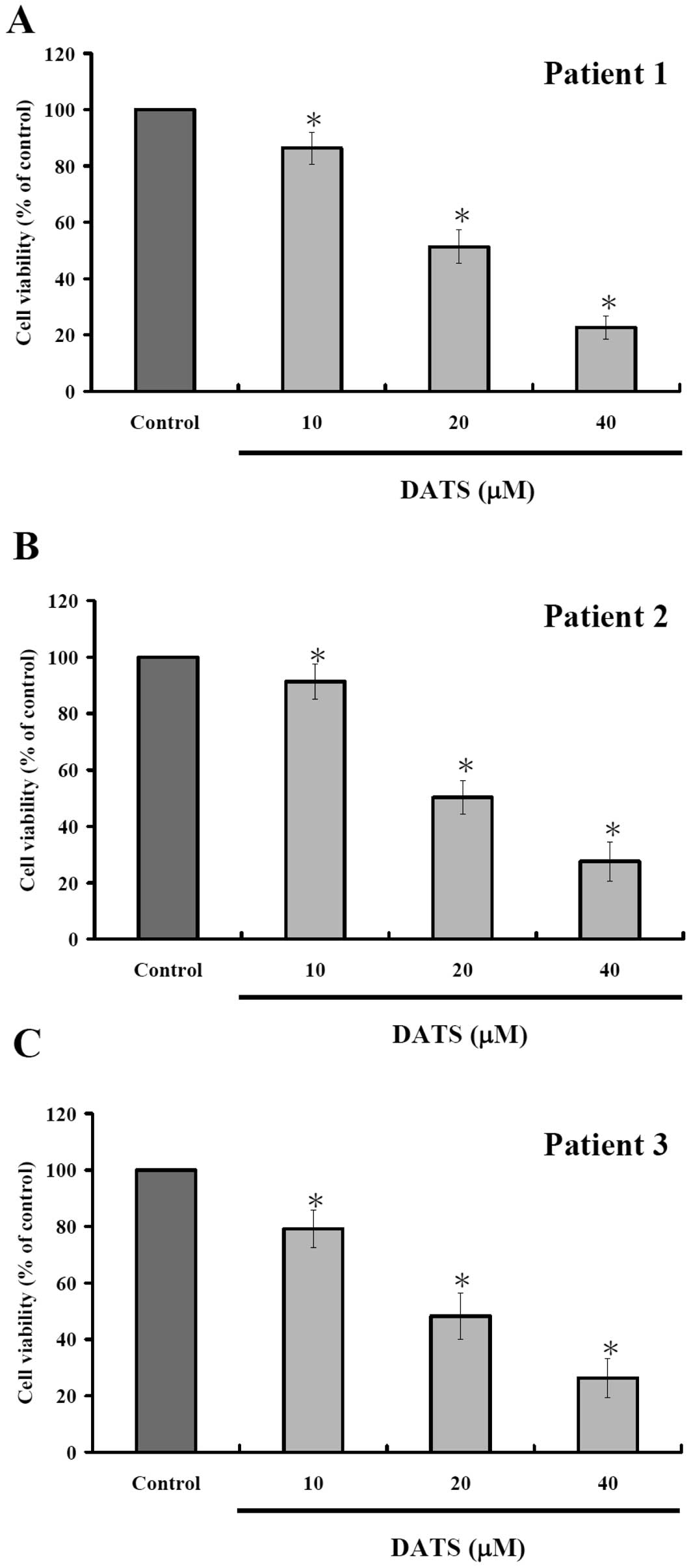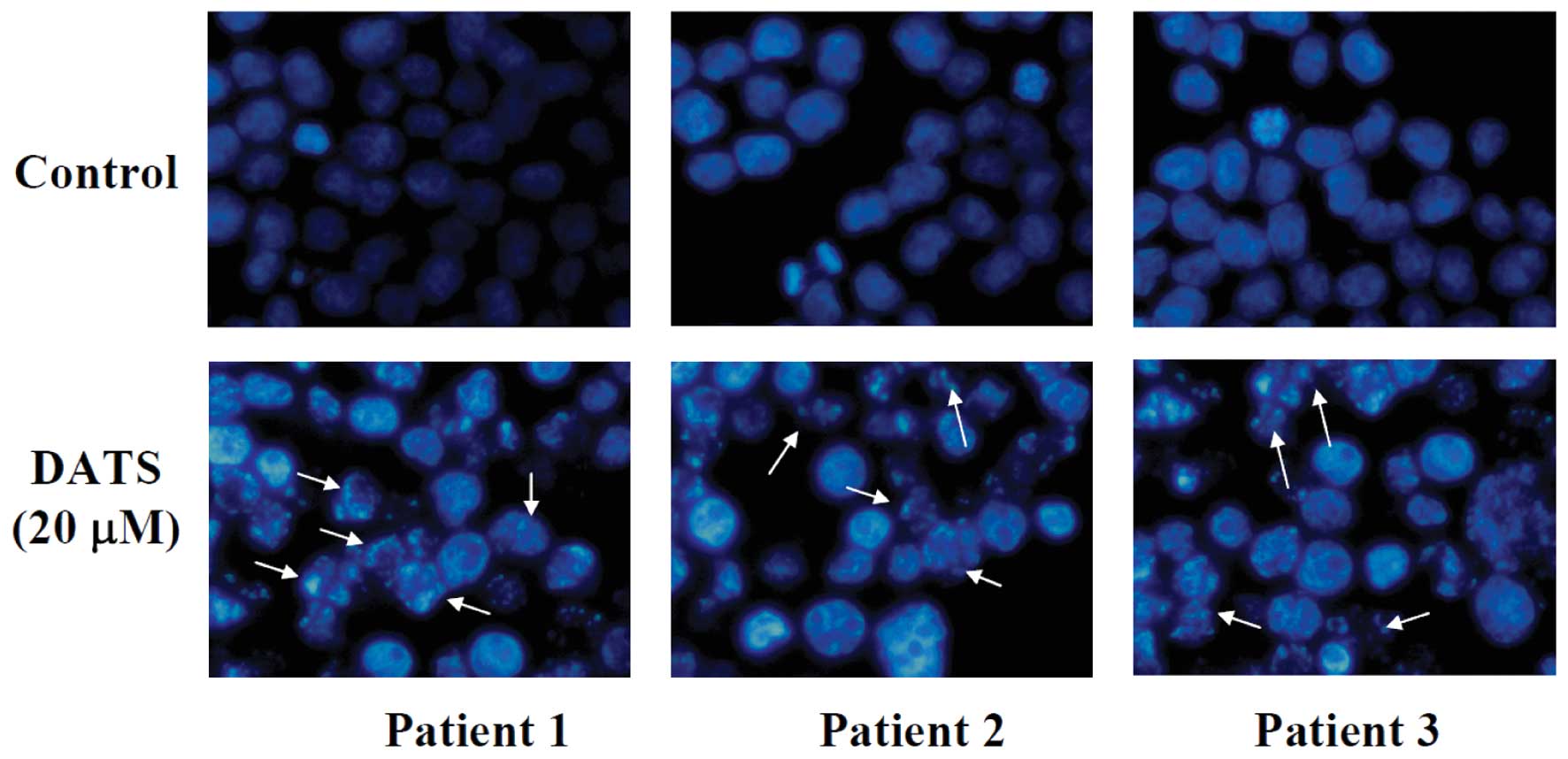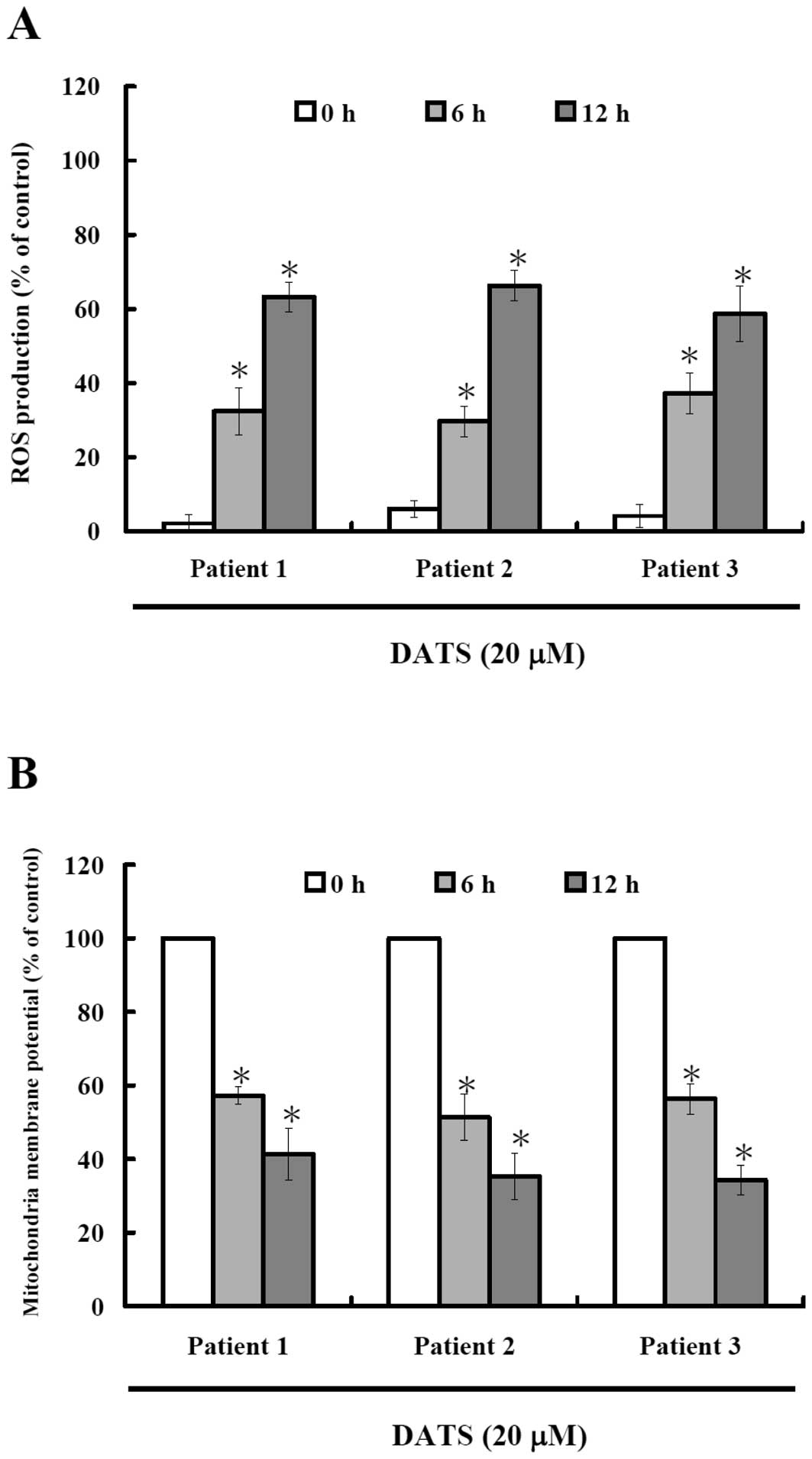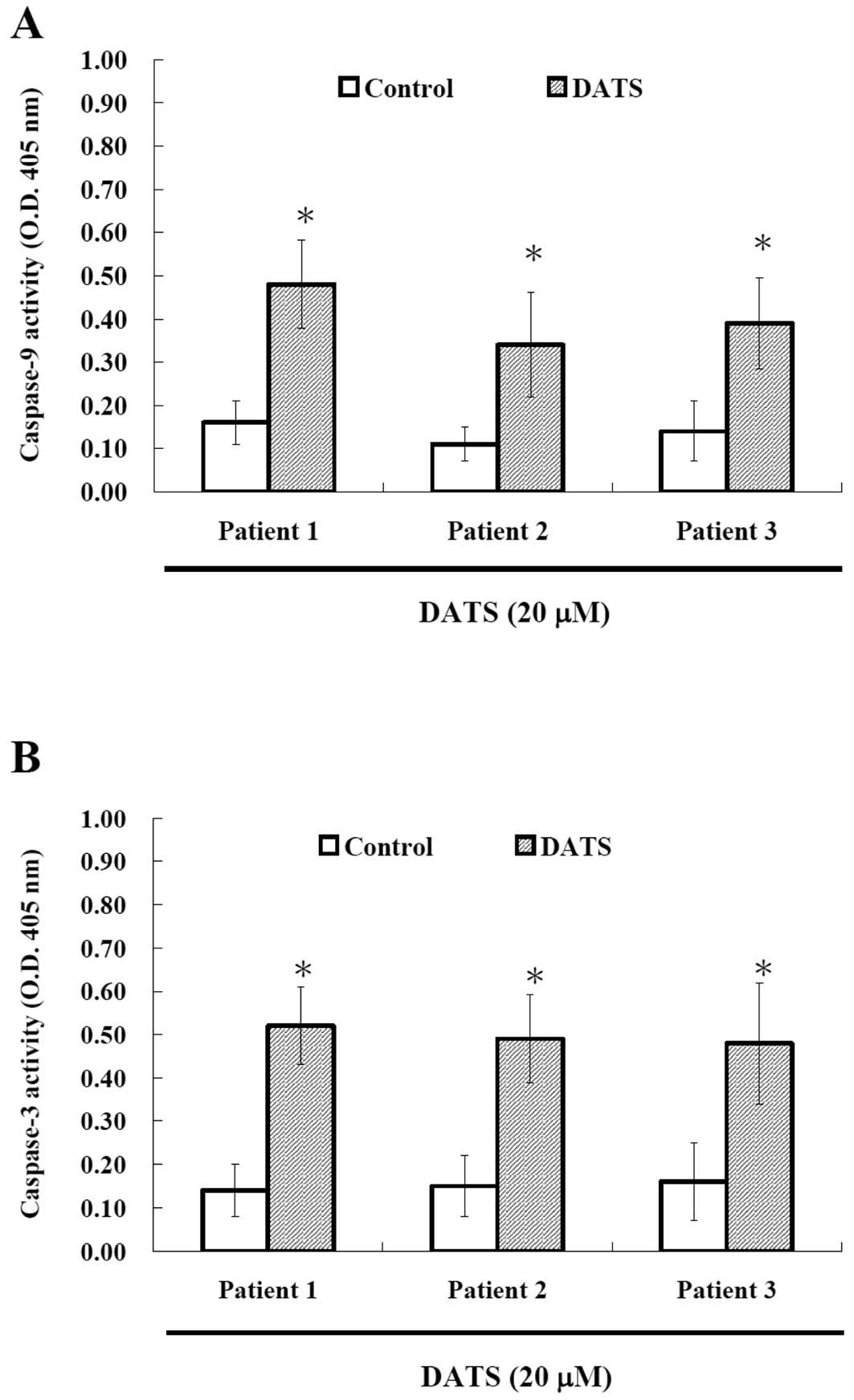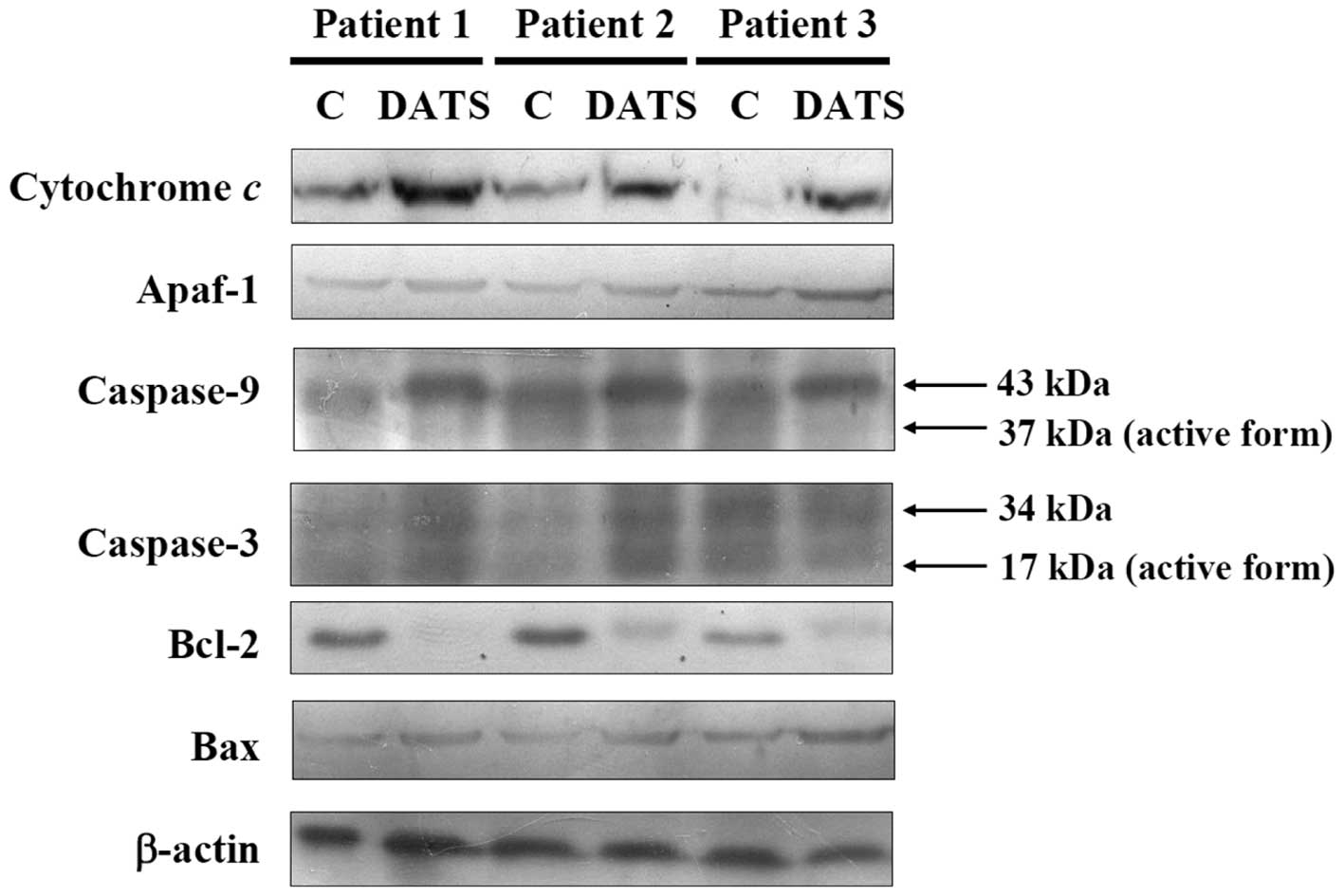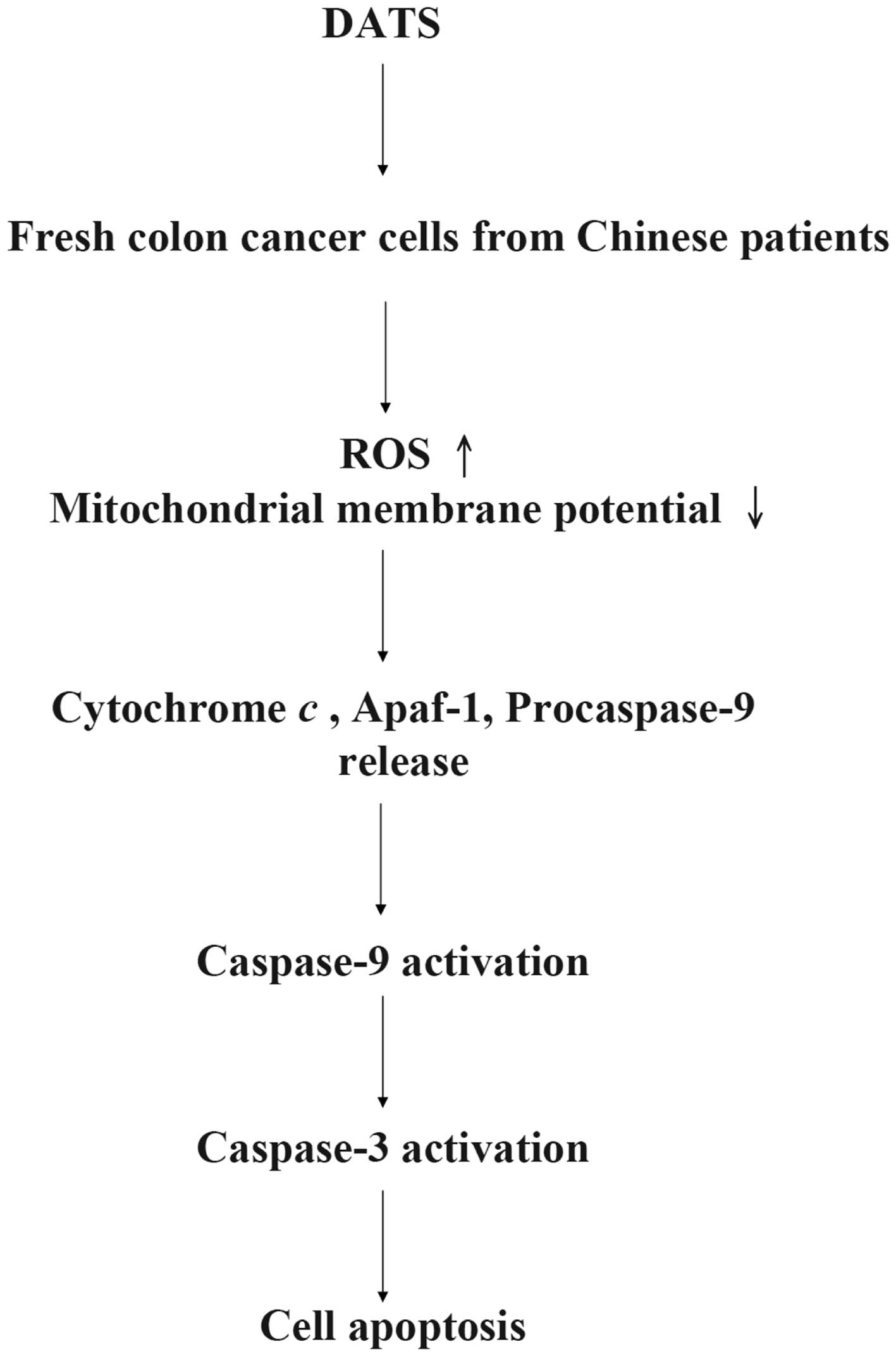|
1
|
Jaramillo S, Lopez S, Varela LM, et al:
The flavonol isorhamnetin exhibits cytotoxic effects on human colon
cancer cells. J Agric Food Chem. Oct 5–2010.(Epub ahead of
print).
|
|
2
|
Nautiyal J, Banerjee S, Kanwar SS, et al:
Curcumin enhances dasatinib-induced inhibition of growth and
transformation of colon cancer cells. Int J Cancer. 128:951–961.
2011. View Article : Google Scholar : PubMed/NCBI
|
|
3
|
van Duijnhoven FJ, Bueno-De-Mesquita HB,
Ferrari P, et al: Fruit, vegetables, and colorectal cancer risk:
the European Prospective Investigation into Cancer and Nutrition.
Am J Clin Nutr. 89:1441–1452. 2009.
|
|
4
|
Davis CD and Milner JA: Gastrointestinal
microflora, food components and colon cancer prevention. J Nutr
Biochem. 20:743–752. 2009. View Article : Google Scholar : PubMed/NCBI
|
|
5
|
Fadeel B and Orrenius S: Apoptosis: a
basic biological phenomenon with wide-ranging implications in human
disease. J Intern Med. 258:479–517. 2005. View Article : Google Scholar : PubMed/NCBI
|
|
6
|
Adams JM and Cory S: Bcl-2-regulated
apoptosis: mechanism and therapeutic potential. Curr Opin Immunol.
19:488–496. 2007. View Article : Google Scholar : PubMed/NCBI
|
|
7
|
Maiuri MC, Zalckvar E, Kimchi A and
Kroemer G: Self-eating and self-killing: crosstalk between
autophagy and apoptosis. Nat Rev Mol Cell Biol. 8:741–752. 2007.
View Article : Google Scholar : PubMed/NCBI
|
|
8
|
Huttemann M, Pecina P, Rainbolt M, et al:
The multiple functions of cytochrome c and their regulation in life
and death decisions of the mammalian cell: from respiration to
apoptosis. Mitochondrion. 11:369–381. 2011. View Article : Google Scholar : PubMed/NCBI
|
|
9
|
Kao ST, Yeh CC, Hsieh CC, et al: The
Chinese medicine Bu-Zhong-Yi-Qi-Tang inhibited proliferation of
hepatoma cell lines by inducing apoptosis via G0/G1 arrest. Life
Sci. 69:1485–1496. 2001. View Article : Google Scholar : PubMed/NCBI
|
|
10
|
Martinou JC and Youle RJ: Mitochondria in
apoptosis: Bcl-2 family members and mitochondrial dynamics. Dev
Cell. 21:92–101. 2011. View Article : Google Scholar : PubMed/NCBI
|
|
11
|
Antony ML and Singh SV: Molecular
mechanisms and targets of cancer chemoprevention by garlic-derived
bioactive compound diallyl trisulfide. Indian J Exp Biol.
49:805–816. 2011.PubMed/NCBI
|
|
12
|
Seki T, Hosono T, Hosono-Fukao T, et al:
Anticancer effects of diallyl trisulfide derived from garlic. Asia
Pac J Clin Nutr. 17(Suppl 1): 249–252. 2008.PubMed/NCBI
|
|
13
|
Li N, Guo R, Li W, et al: A proteomic
investigation into a human gastric cancer cell line BGC823 treated
with diallyl trisulfide. Carcinogenesis. 27:1222–1231. 2006.
View Article : Google Scholar : PubMed/NCBI
|
|
14
|
Sakamoto K, Lawson LD and Milner JA: Allyl
sulfides from garlic suppress the in vitro proliferation of human
A549 lung tumor cells. Nutr Cancer. 29:152–156. 1997. View Article : Google Scholar : PubMed/NCBI
|
|
15
|
Hosono T, Fukao T, Ogihara J, et al:
Diallyl trisulfide suppresses the proliferation and induces
apoptosis of human colon cancer cells through oxidative
modification of beta-tubulin. J Biol Chem. 280:41487–41493. 2005.
View Article : Google Scholar : PubMed/NCBI
|
|
16
|
Pinto JT and Rivlin RS: Antiproliferative
effects of allium derivatives from garlic. J Nutr. 131:S1058–S1060.
2001.PubMed/NCBI
|
|
17
|
Chun HS, Kim HJ and Choi EH: Modulation of
cytochrome P4501-mediated bioactivation of benzo[a]pyrene by
volatile allyl sulfides in human hepatoma cells. Biosci Biotechnol
Biochem. 65:2205–2212. 2001.PubMed/NCBI
|
|
18
|
Antosiewicz J, Herman-Antosiewicz A,
Marynowski SW and Singh SV: c-Jun NH(2)-terminal kinase signaling
axis regulates diallyl trisulfide-induced generation of reactive
oxygen species and cell cycle arrest in human prostate cancer
cells. Cancer Res. 66:5379–5386. 2006. View Article : Google Scholar
|
|
19
|
Xiao D, Zeng Y, Hahm ER, Kim YA,
Ramalingam S and Singh SV: Diallyl trisulfide selectively causes
Bax- and Bak-mediated apoptosis in human lung cancer cells. Environ
Mol Mutagen. 50:201–212. 2009. View
Article : Google Scholar : PubMed/NCBI
|
|
20
|
Xiao D, Choi S, Johnson DE, et al: Diallyl
trisulfide-induced apoptosis in human prostate cancer cells
involves c-Jun N-terminal kinase and extracellular-signal regulated
kinase-mediated phosphorylation of Bcl-2. Oncogene. 23:5594–5606.
2004. View Article : Google Scholar
|
|
21
|
Ji C, Ren F and Xu M: Caspase-8 and
p38MAPK in DATS-induced apoptosis of human CNE2 cells. Braz J Med
Biol Res. 43:821–827. 2010. View Article : Google Scholar : PubMed/NCBI
|
|
22
|
Lai KC, Hsu SC, Kuo CL, et al: Diallyl
sulfide, diallyl disulfide, and diallyl trisulfide inhibit
migration and invasion in human colon cancer colo 205 cells through
the inhibition of matrix metalloproteinase-2, -7, and -9
expressions. Environ Toxicol. Jun 21–2011.(Epub ahead of
print).
|
|
23
|
Wu PP, Liu KC, Huang WW, et al: Diallyl
trisulfide (DATS) inhibits mouse colon tumor in mouse CT-26 cells
allograft model in vivo. Phytomedicine. 18:672–676. 2011.
View Article : Google Scholar : PubMed/NCBI
|
|
24
|
Lai KC, Chiu YJ, Tang YJ, et al:
Houttuynia cordata Thunb extract inhibits cell growth and induces
apoptosis in human primary colorectal cancer cells. Anticancer Res.
30:3549–3556. 2010.PubMed/NCBI
|
|
25
|
Lu CC, Yang JS, Huang AC, et al:
Chrysophanol induces necrosis through the production of ROS and
alteration of ATP levels in J5 human liver cancer cells. Mol Nutr
Food Res. 54:967–976. 2010. View Article : Google Scholar : PubMed/NCBI
|
|
26
|
Chiang JH, Yang JS, Ma CY, et al:
Danthron, an anthraquinone derivative, induces DNA damage and
caspase cascades-mediated apoptosis in SNU-1 human gastric cancer
cells through mitochondrial permeability transition pores and
Bax-triggered pathways. Chem Res Toxicol. 24:20–29. 2011.
View Article : Google Scholar
|
|
27
|
Ho YT, Lu CC, Yang JS, et al: Berberine
induced apoptosis via promoting the expression of caspase-8, -9 and
-3, apoptosis-inducing factor and endonuclease G in SCC-4 human
tongue squamous carcinoma cancer cells. Anticancer Res.
29:4063–4070. 2009.
|
|
28
|
Yang JS, Hour MJ, Huang WW, Lin KL, Kuo SC
and Chung JG: MJ-29 inhibits tubulin polymerization, induces
mitotic arrest, and triggers apoptosis via cyclin-dependent kinase
1-mediated Bcl-2 phosphorylation in human leukemia U937 cells. J
Pharmacol Exp Ther. 334:477–488. 2010. View Article : Google Scholar
|
|
29
|
Ying WZ and Sanders PW: Cytochrome c
mediates apoptosis in hypertensive nephrosclerosis in Dahl/Rapp
rats. Kidney Int. 59:662–672. 2001. View Article : Google Scholar : PubMed/NCBI
|
|
30
|
Chandra-Kuntal K and Singh SV: Diallyl
trisulfide inhibits activation of signal transducer and activator
of transcription 3 in prostate cancer cells in culture and in vivo.
Cancer Prev Res (Phila). 3:1473–1483. 2010. View Article : Google Scholar : PubMed/NCBI
|
|
31
|
Iciek M, Kwiecien I, Chwatko G,
Sokolowska-Jezewicz M, Kowalczyk-Pachel D and Rokita H: The effects
of garlic-derived sulfur compounds on cell proliferation, caspase 3
activity, thiol levels and anaerobic sulfur metabolism in human
hepatoblastoma HepG2 cells. Cell Biochem Funct. 30:198–204. 2011.
View Article : Google Scholar
|
|
32
|
Lee BC, Park BH, Kim SY and Lee YJ: Role
of Bim in diallyl trisulfide-induced cytotoxicity in human cancer
cells. J Cell Biochem. 112:118–127. 2011. View Article : Google Scholar : PubMed/NCBI
|
|
33
|
Xiao D and Singh SV: Diallyl trisulfide, a
constituent of processed garlic, inactivates Akt to trigger
mitochondrial translocation of BAD and caspase-mediated apoptosis
in human prostate cancer cells. Carcinogenesis. 27:533–540. 2006.
View Article : Google Scholar
|















